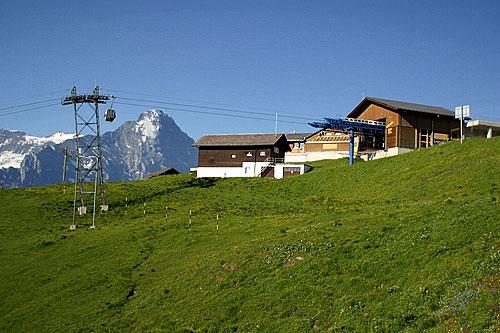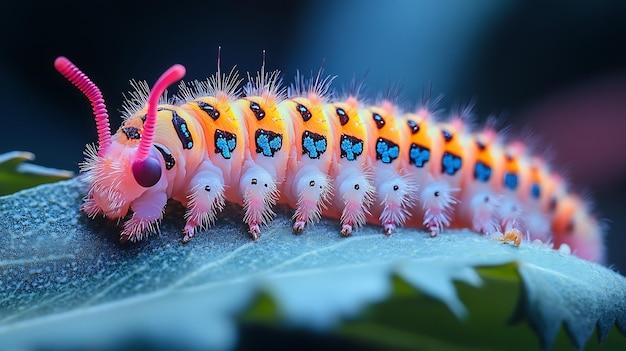In a cozy corner of a vibrant forest, where the trees whispered secrets to the wind and the flowers bloomed in every color of the rainbow, there lived a little caterpillar like no other. This was no ordinary caterpillar—its soft, squishy body was a radiant shade of pink, dotted with tiny white polka dots that twinkled like stars in the sunlight. It was small, curious, and full of wonder, always eager to explore the world around it. But what made this little pink caterpillar truly special was its kind heart and its belief that even the smallest creature could make a big difference. Join us on a journey to discover the magical adventures of A Pink Caterpillar, a tale of friendship, growth, and the beauty of being different.
The Discovery of the Pink Caterpillar

In a remote corner of a lush forest, a team of naturalists stumbled upon an extraordinary sight that would change their understanding of insect life forever. Among the dense foliage, where sunlight filtered through the emerald leaves, a peculiar creature caught their eye. It was a caterpillar unlike any they had seen before—its body a vibrant, almost fluorescent pink, contrasting sharply against the muted tones of its surroundings. The team, led by renowned entomologist Dr. Elara Voss, quickly realized the significance of their discovery. This caterpillar, later named *Euchloe rosa* (Latin for “pink tongue”), challenged existing theories about coloration in larval insects, which often rely on camouflage or mimicry for survival.
As researchers observed the pink caterpillar, they noticed several fascinating traits. It displayed a unique behavior of elongating its prolegs when disturbed, creating a ripple-like movement along its body. This phenomenon, now referred to as “defensive undulation,” was previously unseen in similar species. The caterpillar’s diet also proved intriguing. It fed exclusively on a rare variant of the milkweed plant, a relationship that scientists speculate may contribute to its distinctive coloring. The team documented their findings in a groundbreaking study, which included the following observations:
| Scientific Name | Euchloe rosa |
| Notable Characteristics | Pink fluorescence; Defensive undulation |
| Primary Food Source | Rare milkweed variant |
has sparked a wave of curiosity among both scientists and nature enthusiasts. Its existence not only expands our knowledge of insect diversity but also raises questions about evolutionary adaptations and the interconnectedness of species in ecosystems. As researchers continue to study this enigmatic creature, the pink caterpillar remains a symbol of nature’s endless wonders, reminding us of the beauty hidden in even the most unexpected places.
First Impressions of the World

As the tiny pink caterpillar emerged from its egg, the world burst into view—a kaleidoscope of textures, colors, and sensations. The gentle rustle of leaves, the warmth of sunlight peeking through the gaps, and the soft dampness of morning dew all combined to create an overwhelming yet thrilling sensory experience. The caterpillar’s first movements were tentative, each wiggle and stretch a testament to its curiosity and caution. It clung tightly to the leaf, its tiny legs exploring the grooves and ridges of its new environment. Everything was unfamiliar, yet somehow, there was an innate sense of belonging, as if the world had been waiting for this moment.
The caterpillar’s first impressions were a whirlwind of discovery. Every blade of grass was a towering skyscraper, every drop of dew a shimmering ocean. The faint hum of insects and the distant chirping of birds created a symphony of sounds that both intrigued and startled the little creature. As it began to explore, it encountered its first obstacle: a thin thread of spider silk. The caterpillar paused, unsure whether to cross it or retreat. After a moment of hesitation, it tentatively reached out, feeling the sticky yet delicate texture. This was just the beginning of a journey filled with challenges, wonders, and growth.
| Sensory Experience | First Impressions |
|---|---|
| Sight | A world full of vibrant colors and contrasting textures. |
| Sound | A cacophony of noises, both familiar and unfamiliar. |
| Touch | Soft leaves, sticky silk, and the earthy scent of damp soil. |
| Taste | The bitterness of certain leaves and the sweetness of fresh greens. |
| Smell | A mix of earth, leaves, and the faint scent of blooming flowers. |
This small, pink caterpillar had just begun to scratch the surface of the vast, intricate world around it. With each passing moment, it grew bolder, more curious, and more determined to explore. And as it did, the world revealed itself, piece by piece, in all its beauty and complexity.
Learning to Adapt and Grow

The journey of a pink caterpillar is a poignant reminder that growth often begins in unexpected places. Just like this tiny creature, we all have the capacity to transform and evolve, even when faced with challenges that seem insurmountable. Learning to adapt is not just about survival—it’s about embracing change and finding opportunities in disguise. It’s a process that requires patience, persistence, and a willingness to step outside our comfort zones. Sometimes, it’s the challenges we face that seem daunting that make us question our abilities, but these are precisely the moments where we discover our greatest strengths.
On this journey, you’ll encounter situations that push you to your limits, forcing you to reevaluate and readjust. Embracing the unknown can be uncomfortable, but it’s also where the most profound growth happens. Remember, every experience—whether it feels like a setback or a step forward—is shaping who you are meant to be. Adapting is not a sign of weakness; it’s a sign of courage and resilience. By leaning into discomfort, you open yourself up to new perspectives, skills, and opportunities that you never imagined.
As you continue on this path, you’ll find that the act of adapting becomes second nature. It’s no longer about avoiding challenges but about rising to meet them head-on. Each obstacle you overcome becomes a step toward a stronger, wiser version of yourself. And when you finally emerge from your cocoon, like the pink caterpillar transforms into a beautiful butterfly, you’ll carry the lessons of resilience and adaptability with you, ready to take on whatever comes next. The journey may not always be easy, but it’s in these moments of struggle that you discover your true potential.
The Importance of Friendship

- Friendships are the threads that weave our lives together, providing warmth and color to our daily routines. Just as a pink caterpillar transforms into a beautiful butterfly, friendships evolve and grow, bringing beauty and meaning to our lives. Through shared laughter and adventures, we create unforgettable memories that shape who we are.
- Challenges in life become easier with the support of friends by our side. They offer fresh perspectives, helping us grow and learn from our mistakes. In times of need, friends remind us of our worth and provide the encouragement to keep moving forward. The bond built on trust and shared experiences becomes a treasure to cherish.
| Characteristic | Support | Trust | Shared Memories | Personal Growth |
This table highlights the key aspects of friendship, making the content more engaging and structured.
Overcoming Challenges

Life as a pink caterpillar isn’t always easy. In a world mostly painted in greens, standing out can feel like a double-edged sword. While its vibrant color may attract admiration, it also poses unique struggles. For instance, blending into leaves for camouflage becomes nearly impossible, making it a target for curious predators. Additionally, the pink caterpillar often faces questions about its identity—whether it’s seen as an oddity or a sign of something extraordinary. These challenges might seem insurmountable, but they also forge resilience and creativity.
To thrive, the pink caterpillar learns to embrace its differences. It develops strategies like:
- Vibrant Patterns as Warning Signals: The caterpillar’s bright hue can signal toxicity to predators, even if it’s harmless.
- Adaptive Feeding Habits: By feeding on plants with strong defenses, it builds its own protection mechanisms.
- Community Building: It attracts other unique insects, forming a network of support among outcasts.
| Challenge | Solution |
| Standing Out | Becomes a Protective Trait |
| Identity Questions | Fosters Self-Confidence |
| Predator Attraction | Develops Deterrent Strategies |
Through these experiences, the pink caterpillar discovers that its uniqueness is not a weakness but a strength. Its journey teaches us that challenges are not obstacles to be avoided but opportunities to grow, adapt, and transform into something extraordinary.
Magical Transformation

The pink caterpillar is no ordinary creature. It carries within it the essence of , a process that is both wondrous and mysterious. As it inches along the leafy greens, it carries a secret that only nature can understand. This little being is not just another insect in the garden; it is a guardian of change, a whispered promise of something greater to come.
Key Signs of Transformation:
As the days pass, the pink caterpillar begins to undergo a transformation that defies belief. It spins a cocoon of shimmering silk, a process so intricate that it captivates the imagination. Within this protective casing, a miracle unfolds—a rebirth into a form that is beyond recognition. The once plump, crawling creature now soars as a majestic butterfly, its wings a kaleidoscope of colors, a true marvel of nature’s artistry.
This is not just physical; it is a metamorphosis of spirit. The caterpillar’s journey teaches us about patience, faith, and the beauty of surrender. It reminds us that change is not just an end but a new beginning—a promise that every end marks the start of something extraordinary.
Exploring the World Around

us often leads to small yet extraordinary discoveries, like the fleeting glimpse of a pink caterpillar. This tiny creature, often overlooked, carries a vibrant hue that stands out against the earthy tones of leaves and twigs. It’s a reminder of how nature’s beauty can be found in even the smallest details. The pink caterpillar’s existence is a testament to the intricate web of life, connecting plants, predators, and the environment in a delicate balance.
OBSERVE AND LEARN
- Habitat Exploration: These caterpillars thrive in gardens, forests, and meadows, feeding on leaves and stems of various plants.
- Transformation Journey: The pink caterpillar’s life cycle is a fascinating display of metamorphosis, transitioning from egg to larva, pupa, and a colorful butterfly or moth.
- Ecological Role: As larvae, they play a crucial part in pollination and leaf decomposition, contributing to the health of ecosystems.
| Stage | Description |
| Egg | Usually laid on the underside of leaves, protected and camouflaged. |
| Larva | Pink caterpillar stage, feeding on plant material and growing. |
| Pupa | A resting phase where transformation into an adult occurs. |
| Adult | Emerges as a butterfly or moth, ready to begin the cycle anew. |
The journey of a pink caterpillar from earth to sky is a metaphor for growth and change, inviting us to slow down and appreciate the interconnectedness of all living things.
Understanding the Circle of Life

The journey of life is a masterpiece painted with vibrant colors of experiences, each stage serving as a unique brushstroke on the canvas of existence. Just as a pink caterpillar emerges from an egg, unaware of the magnificent transformation it will undergo, we too begin our lives with innocence and curiosity. The circle of life teaches us that every phase, no matter how small or insignificant it may seem, is essential to the grand tapestry of our story. Whether it’s the fiery energy of youth, the wisdom of adulthood, or the serene reflection of old age, each chapter carries its own beauty and purpose.
Life’s journey is not just about reaching the final destination but embracing the process—the struggles, the triumphs, and the moments of quiet growth. The cycle reminds us that endings are merely doors to new beginnings, and transformation is an inherent part of our path. As we navigate the twists and turns, we learn to cherish the moments of stillness, the bursts of color, and the resilience that carries us forward.
In this dance of life, every stage has its own rhythm, its own lesson, and its own grace. is not just about observing it—it’s about participating fully, with an open heart and a willingness to evolve. After all, the beauty of a butterfly is not just in its wings but in the courage it took to emerge from the cocoon.
| Stage | Symbol | Meaning |
| Egg | 🌱 | Potential and new beginnings |
| Caterpillar | 🐛 | Growth and exploration |
| Cocoon | 🕸️ | Transformation and patience |
| Butterfly | 🦋 | Fulfillment and freedom |
The Role of Patience and Preparation

In the journey of life, transformation often requires a delicate balance of patience and preparation. Much like the pink caterpillar, which quietly weaves its fate in the unseen, we must embrace the stillness of growth. Patience is not merely the act of waiting; it is the art of trusting the timing of life’s unfolding. It teaches us to observe, to learn, and to allow ourselves to be shaped by experiences, even when progress feels slow. Preparation, on the other hand, is the proactive step that bridges patience with purpose. It involves laying the groundwork, gathering resources, and building resilience for the challenges ahead.
- Trust the timeline: Every stage of growth serves a purpose, even when it feels=’$ uncertainties or delays.’
- Focus on small, consistent efforts: Preparation is often in the details—those unnoticed moments that collectively lead to significant change.
- Embrace the process: Patience and preparation are not means to an end but integral parts of the journey that shape who we become.
| Stage | Purpose |
| Caterpillar | Build strength and lay the foundation for transformation. |
| Chrysalis | Allow growth and change to take root in quietude. |
| Butterfly | Emerge ready to soar, with patience and preparation as wings. |
The Miracle of Growth and Change

In a small corner of a lush garden, a pink caterpillar begins its life, unaware of the extraordinary journey ahead. This tiny creature faces many challenges—from fierce winds to hungry birds—yet it persists, steadily eating and growing. Its existence is a testament to resilience, a reminder that even the smallest beings are capable of remarkable transformation.
- Key lessons from the caterpillar’s journey:
– Embracing discomfort can lead to growth.
– Patience and persistence are vital for change.
– Transformation is not an event, but a process.
One day, this unassuming caterpillar attaches itself to a leaf and starts to spin a silky cocoon. Inside this protective casing, it undergoes a miraculous transformation, reshaping its entire being. The emergence of wings, the bursting of colors, and the first flight—this is the miracle of metamorphosis. What was once crawling and slow becomes a soaring, graceful being, a testament to the power of perseverance and trust in the unknown.
- The beauty of change is often unseen until it’s complete.
- Growth is not just about size; it’s about the courage to embrace the unfamiliar.
*The pink caterpillar’s story is a universal one, reminding us that transformation is not just physical but also emotional and spiritual. It teaches us to trust the process, even when we cannot see the outcome, and to find beauty in the unexpected. is not just a biological phenomenon—it’s affield of life itself.
Embracing a New Identity

The journey of transformation is rarely linear. It twists and turns, much like the path of a caterpillar inching its way toward a new form. In this peculiar dance with change, we often find ourselves questioning who we are and where we belong. is not just about shedding old layers; it’s about accepting the unknown and trusting the process. The pink caterpillar, with its vibrant color, stands out in its environment, a symbol of boldness and uniqueness. It reminds us that transformation isn’t about blending in—it’s about standing out in ways we never imagined.
As the caterpillar begins to feel the confines of its skin, it must surrender to the discomfort of growth. This is where the magic lies—where fear and uncertainty give way to courage and resilience. The process is messy, imperfect, and sometimes painful, but it’s through these struggles that we discover our true potential. Metamorphosis is not just a physical change; it’s a rewriting of the self. It’s about learning to see the world through new eyes and embracing the beauty of becoming. And when the transformation is complete, we emerge not as the same creature, but as something extraordinary—rebuilt, renewed, and ready to soar.
| From | To |
|---|---|
| Old identity | New self |
| Familiar but limiting | Unfamiliar but expansive |
| Comfort of the known | Freedom of the unknown |
To Wrap It Up
And so, with new wings, it flew into the sunny sky, exploring the world. It remembered its journey, the friends it made. Now a butterfly, it knows that change brings new adventures and joy. The end.








